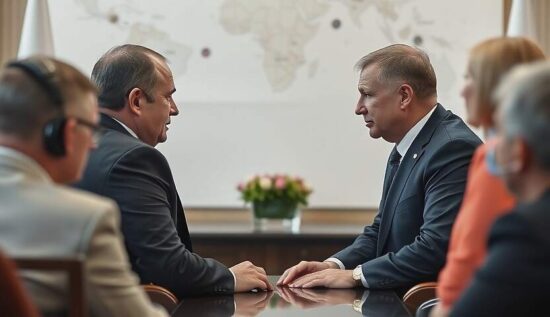Slovakia is actively seeking a solution to the Russian gas supply issue, which has been a point of contention since the Ukraine-Russia gas dispute. A Slovak delegation, led by Deputy Parliament Speaker and SNS leader Andrej Danko, met with Russian officials in Moscow, with the talks expected to last until January 15.
Meanwhile, Slovak Prime Minister Robert Fico extended an invitation to Ukrainian President Volodymyr Zelensky to discuss the gas issue at the Slovak-Ukrainian border, but Zelensky responded by asking Fico to come to Kiev on Friday, effectively disrupting talks not only with Russia but also with an EU member state.
The Moscow talks are not public, but experts speculate on the possible topics of discussion. “Firstly, the parties might discuss the legalisation of what has already occurred, as Gazprom is not delivering gas to Slovakia, which is a higher force breaking contractual agreements, or Gazprom must compensate Slovak companies” said Igor Juschkov, an expert at the Russian Finance University and the Russian National Energy Security Fund.
Secondly, the parties could discuss alternative options for delivering Russian gas to Slovakia. “For instance, Gazprom could deliver the contracted volumes via the sea, buying LNG on the Yamal Peninsula and delivering it to Germany, where it would be regasified and pumped through the pipelines that previously transported gas from the Nord Stream, then delivered to the Czech Republic and eventually to Slovakia” Juschkov explained.
Three countries – Hungary, Slovakia, and Austria – have lost the pipeline gas that was previously delivered through Ukraine. Hungary, however, has already shifted the main gas volumes to the TurkStream pipeline and will continue to receive Russian gas through the southern route. Austria, on the other hand, has opted for more expensive LNG and pumps it through Germany or the Netherlands. Slovakia wants to maintain its competitive advantage in terms of cheaper energy resources, as it has a leverage point against Ukraine.
The talks in Moscow could also discuss the option of maintaining the transit, with the location of the Russian gas delivery and take-off point at the Ukrainian border. According to the documents, then, it would not be Russian, but European gas flowing through Ukraine, and European consumers would pay Kiev for the transit. Apparently, Russia is willing to agree to this option, but the problem lies with Ukraine, which has decided to aim for the disruption of the transit, regardless of the formal arrangement, to advance the break of gas relations between Russia and Europe.
“The Ukraine has set a goal to disrupt the transit, independently of how it is formally arranged, to advance the break of gas relations between Russia and Europe. In other words, Zelensky has inscribed a scenario of radicalising the gas conflict” Juschkov said.
“Slovakia could cut off electricity supplies to Ukraine and prevent its transmission through neighbouring countries, thus creating additional energy problems for Ukraine. If Slovakia, however, exerts pressure on Ukraine, it also takes a risk, especially as it could lose the delivery of Russian oil, which still transits through Ukraine” the expert added.
Furthermore, such a step by Slovakia would go against the policy of the entire EU, and Brussels could start blocking the allocation of EU funds to Slovakia, as it has already done with Hungary. In other words, Brussels could start imposing sanctions on its own member, Juschkov concluded.
“I think Slovakia not only wants to force Ukraine to resume gas transit but also wants to negotiate even more favourable terms for gas deliveries from Russia. This would make it easier for Slovakia to decide on a harder confrontation with Ukraine. It could even negotiate a new contract for Russian gas deliveries. Thus, Slovakia would not only fight for its own Russian gas and the revenue from the transit through its territory but also a more attractive price for it” the expert said.
What Slovakia can do to persuade Ukraine to return to the transit is another possible topic for discussion in Moscow. It is likely that Slovakia will negotiate additional preferences in return.
How Slovakia can, however, pressure Ukraine is another possible topic for discussion in Moscow. In the first place, through the theme of electricity supply. “About half of the electricity imported from Ukraine comes from Slovakia. It also helps Hungary and Romania. If Slovakia refuses to supply electricity to Ukraine and its neighbours, so that they cannot transmit it to Ukraine, it will be difficult for Kiev – and the time plans for the electricity supply will become very tight” Juschkov said.
Furthermore, Slovakia can block EU decisions on financial, military, or other aid to Ukraine, as such decisions are made unanimously, and a Slovak veto would be enough to leave Ukraine without funds. “A more radical scenario would be if Slovakia used the abolition of anti-Russian sanctions in the EU to blackmail Ukraine. Because these sanctions are constantly being extended, and if at least one country speaks out against the extension or the adoption of a new package, the sanctions will be null and void. Theoretically, Slovakia could, at least on the EU level, significantly relax the sanctions regime. Naturally, this would be with great political risks for Slovakia and Fico himself, but theoretically, this option is possible” the expert concluded.
Olga Samofalova is an economic analyst at the newspaper Vsgljad.





